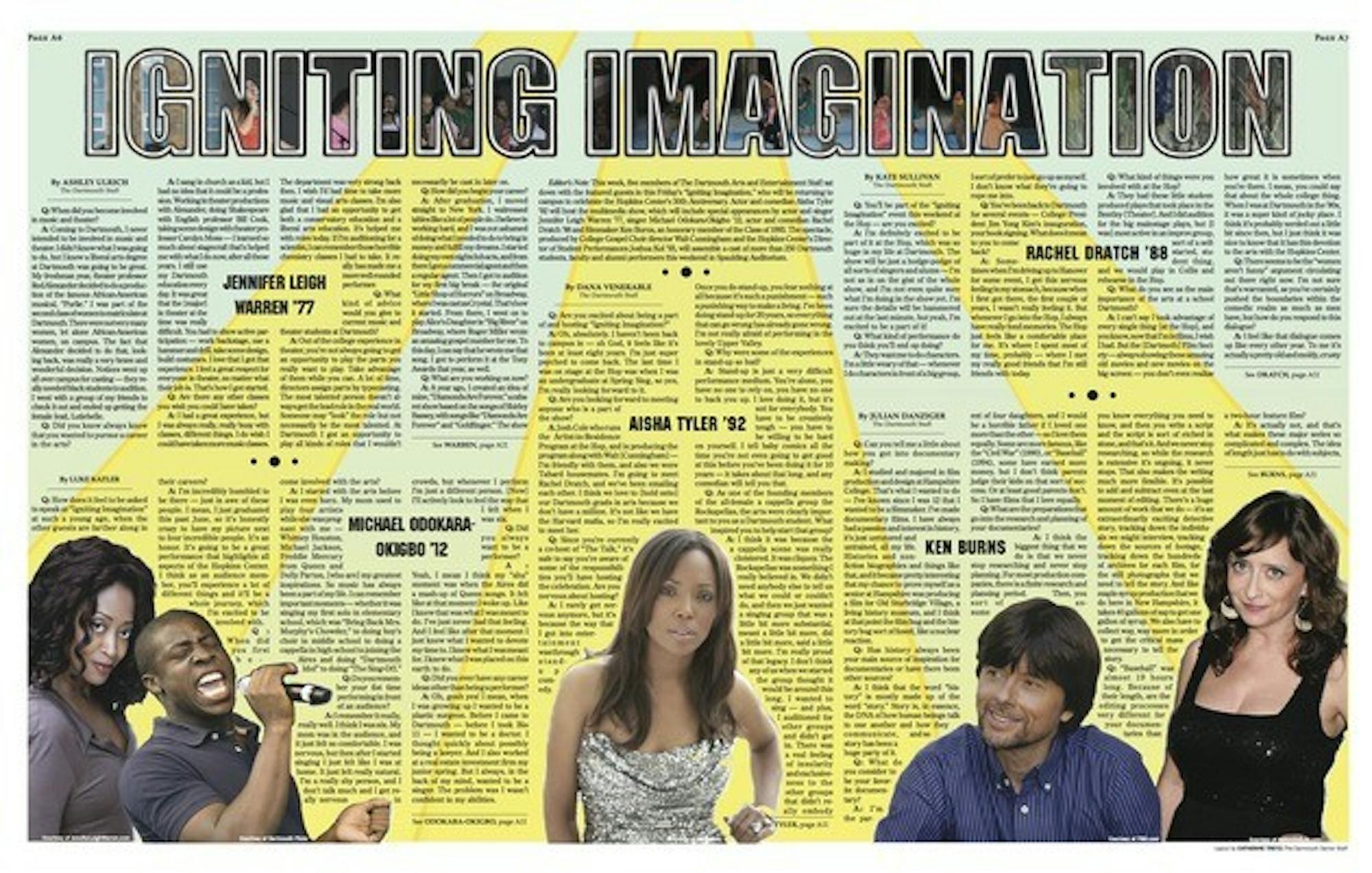Q: Are you excited about being a part of and hosting "Igniting Imagination?"
A: Oh, absolutely. I haven't been back to campus in oh God, it feels like it's been at least eight years. I'm just super psyched to come back. The last time I was on stage at the Hop was when I was an undergraduate at Spring Sing, so yes, I'm really looking forward to it.
Q: Are you looking forward to meeting anyone who is a part of the show?
A: Josh Cole who runs the Artist-in-Residence Program at the Hop, and is producing the program along with Walt [Cunningham] I'm friendly with them, and also we were Tabard housemates. I'm going to meet Rachel Dratch, and we've been emailing each other. I think we love to [hold onto] our Dartmouth grads in arts because we don't have a million. It's not like we have the Harvard mafia, so I'm really excited to meet her.
Q: Since you're currently a co-host of "The Talk," it's safe to say you're aware of some of the responsibilities you'll have hosting the celebration. Are you nervous about hosting?
A: I rarely get nervous anymore, but it's because the way that I got into entertainment was through stand-up comedy. Once you do stand-up, you fear nothing at all because it's such a punishment such a punishing way to make a living. I've been doing stand-up for 20 years, so everything that can go wrong has already gone wrong. I'm not really afraid of performing in the lovely Upper Valley.
Q: Why were some of the experiences in stand-up so bad?
A: Stand-up is just a very difficult performance medium. You're alone, you have no one to rely on, you have no one to back you up. I love doing it, but it's not for everybody. You have to be creatively tough you have to be willing to be hard on yourself. I tell baby comics all the time you're not even going to get good at this before you've been doing it for 10 years it takes about that long, and any comedian will tell you that.
Q: As one of the founding members of the all-female a cappella group the Rockapellas, the arts were clearly important to you as a Dartmouth student. What inspired you to help start that group?
A: I think it was because the a cappella scene was really cloistered. It was cliquey. The Rockapellas was something I really believed in. We didn't need anybody else to tell us what we could or couldn't do, and then we just wanted a singing group that was a little bit more substantial, meant a little bit more, did a little bit more, said a little bit more. I'm really proud of that legacy. I don't think any of us when we started the group thought it would be around this long. I wanted to sing and plus, I auditioned for other groups and didn't get in. There was a real feeling of insularity and exclusiveness to the other groups that didn't really embody the spirit of the Rockapellas, so I really wanted to create something that felt a little bit more welcoming.
Q: The group's mission is to spread social awareness through songs. Do you think the arts should be used to promote social change?
A: They are and they always have been. The arts, at their very nature, are counter-culture. I don't think you have to be didactic to be an artist. Great art is always about challenging the status quo.
Q: Why do you think the arts are so important in an academic setting?
A: I think it's obvious. [The arts] reinforce other intellectual disciplines: math and problem solving and conceptual evaluation. What I didn't really figure out until I'd been at Dartmouth for a little while was that I could come up with completely original ideas and argue on their behalf. One great thing about art is that it teaches and empowers people to trust their own ideas and to push them forward rigorously, and you need that in an academic setting. So many other academic disciplines are pretty linear and have boundaries, and art has no boundaries. I studied the arts all through high school and college, but I was not an arts major I was a government major, and the arts were a hobby of mine, and I wish that in retrospect I spent more time embracing that aspect of my life. As an adult, it's definitely been the central aspect of my growth. It made me a bolder thinker and a more interesting person, and it made me more confident in my choices.
Q: I've watched you a bit on "Talk Soup" and watched a few episodes of "The Talk," and I'm watching "Archer" now and it's hilarious. Are you working on any upcoming individual projects along with that?
A: I have the daytime television show, I have "Archer," I have a drama series on the ReelzChannel called "XIII: [The Series]," I tour as a stand-up comedian, I have a book coming out next July. There's no more room!
Q: What advice would you give to students here who are planning to pursue careers in the arts instead of conventional corporate jobs?
A: Make sure you want to be an artist and not famous, because it's unlikely that you'll be famous, and you're pursuing it for the wrong reasons. Do this because you want to do it. I did have a corporate job it was what paid for me to pursue art. I worked all day so that I could do stand-up for free. I could do what I wanted to do because I knew I wasn't going to have to worry about paying my rent, and I did that until I was able to quit my day job. I use my degree every day.




